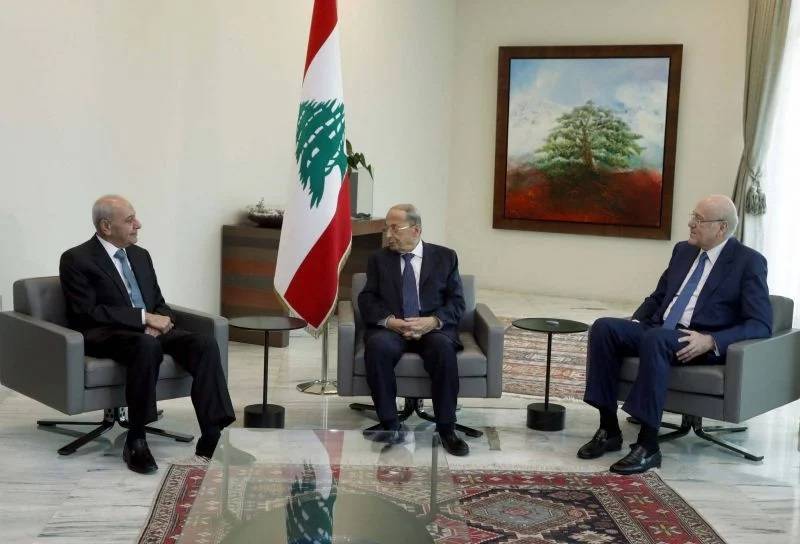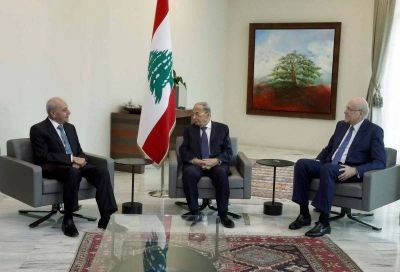
President of the Republic Michel Aoun surrounded by Prime Minister Najib Mikati (r) and Speaker of Parliament Nabih Berri, Sept. 10, 2021 in Baabda. (Photo archives Dalati and Nohra)
“The hardest part is yet to come.” This is how Parliament Speaker Nabih Berri commented on the then-imminent election of Michel Aoun in October 2016.
At the time, unlike the rest of the major traditional political parties, the Amal Movement was opposed to the settlement that had enabled Michel Aoun’s accession to Baabda. Nabih Berri, on the other hand, was in favor of the Maronite leader of Zgharta, the head of the Marada Movement Sleiman Frangieh.
While Berri was faced with a fait accompli six years ago, things have changed today. Unlike Michel Aoun, who is set to leave the presidential palace in about three months, Berri has just been re-elected for another four-year term as Parliament speaker.
Having been re-elected, he would now play a role in the tug of war between the president and Prime Minister-designate Najib Mikati. The latter declared a real war on the Aounist camp by taking the energy portfolio out of its hands in his latest proposed cabinet lineup, which is “a prospect that pleases Berri,” according to a source close to the negotiations.
The ally of my ally…
The rivalry runs deep between the Shiite leader and the Maronite general, although they are both within the Syria-aligned March 8 camp. Each of them perceives the other as “the ally of my ally,” and never as a direct ally. Each of them tries to bring Hezbollah to its side. This gives the Iran-aligned party, whose relations with its Shiite counterpart have not always been good, a hard time.
In 1990, the Damascus agreement forged the alliance between Amal and Hezbollah. Berri and Sheikh Sobhi Tufayli, Hezbollah’s secretary general at the time, turned the page on the violence that had pitted the two parties against each other since 1987, and the parties proceeded to divide the tasks among themselves in a Lebanon under Syrian occupation.
Thus, for more than a decade, Hezbollah had focused on “resisting” Israel, leaving the political management of the country to its partner, which invested in the state institutions and conquered the Parliament in 1992.
But this agreement was implicitly called into question in 2006, when a similar one, the Mar Mikhael deal, was signed between Aoun and Hassan Nasrallah.
The incompatibility between these two agreements has de facto put Amal and the FPM in competition for control of public institutions, a competition that the FPM won in 2016 after its founding father was elected president.
However, Berri refuses to admit defeat easily. During the parliamentary session of Oct. 31, 2016, Berri decided to play on the nerves of the MP for Kesrouan, who was elected president only after three endless rounds of voting.
“The hour of great jihad has come,” Berri said just after the election.
Today, Aoun’s term is coming to an end. This is undoubtedly a pleasing prospect for the Parliament speaker, who also seems to have a desire to complicate the general’s exit from Baabda.
These last few weeks were not easy for Aoun, who has been engaged in a tough battle with Mikati, who will be handed over presidential powers in the event of a presidential vacuum, over the formation of the new cabinet.
In this battle, Berri has of course taken a side, and according to information gathered by L’Orient-Le Jour, it is with Mikati.
This is evidenced by the prime minister-designate’s visit to Ain al-Tineh, only a few days after the battle started between Aoun and Mikati.
Speaking to L’Orient-Le Jour, a source close to Berri denies, however, any involvement by the Parliament speaker in this war.
“The Constitution is clear. The role of Parliament is limited to the appointment of a prime minister following the binding consultations, and then giving a vote of confidence to the cabinet formed. In the meantime, it is up to the prime minister-designate and the president of the republic to discuss the formation of the ministerial team,” the figure explained.
“However, Berri is a major political player whose opinion is surely taken into account in the negotiations. And he is satisfied with the first cabinet version presented by Mikati,” the source added.
In this first proposed lineup, the Amal movement maintains its three portfolios: Finance, Culture and Agriculture. While the caretaker ministers holding these last two portfolios have been reappointed, Youssef Khalil has been replaced in the Finance Ministry by former Amal MP Yassin Jaber.
Amal is therefore given political representation in this lineup, unlike the FPM. However, the Aounists have been calling since the May 15 parliamentary elections for an end to the technocratic cabinets called for by the Oct. 17 uprising, and for the formation of a team composed at least partially of politicians.
The enemy of my enemy…
But the alignment between Berri and Mikati goes beyond the mere distribution of portfolios in the next ministerial team. The link between them is reinforced by the fact that they are both in confrontation with the president.
For Berri, supporting Mikati in his tug of war with Aoun is the best way to take revenge on the person who Hezbollah imposed on him.
“Berri wants to prevent Aoun from having the slightest accomplishment on his record,” a well-informed source told L’Orient-Le Jour. The record of Aoun’s term is indeed way below expectations. The latter had promised to implement many key reforms when he was still in the opposition, both in the fight against corruption and in the political system.
As a result, and to salvage the track record of his six-year term, the founder of the FPM has tried to capitalize on issues including the forensic audit of BDL’s accounts or the demarcation of the maritime border with Israel.
In a short video posted on his Twitter account on Wednesday, the current FPM leader and president’s son-in-law, Gebran Bassil, accused some political parties, without naming them, of seeking to not carry out reforms.
“They don’t want justice to be done in the Beirut port investigation... They don’t want the forensic audit... They don’t want the refugees’ return without an agreement with the international community,” he said.
He also accused Mikati and his supporters of wanting to prevent the formation of the cabinet in the remaining months of his father-in-law’s term.
All eyes are certainly riveted on the post-Aoun era, to the point that Berri has promised, according to his close circle, to convene a parliamentary session to elect a successor to his worst enemy as early as Sept. 1, the day after Aoun’s term ends — as if to show how eager he is to get it over with.
This article was originally published in French in L'Orient-Le Jour. Translation by Joelle El Khoury.
